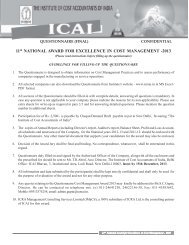This Issue - Icwai
This Issue - Icwai
This Issue - Icwai
You also want an ePaper? Increase the reach of your titles
YUMPU automatically turns print PDFs into web optimized ePapers that Google loves.
LEGAL LEGAL EDUCATION<br />
EDUCATION<br />
Court of India has already made some observations<br />
in this regard in cases like Salem Advocates<br />
Bar Association vs Union of India and V. Sudeer<br />
vs Bar Council of India. In the recent past, the<br />
National Knowledge Commission has made certain<br />
recommendations in its report—particularly in the<br />
area of research in legal education.<br />
The suggestions/recommendations made by these<br />
bodies are briefly discussed hereunder :<br />
(a) The Law Commission’s Recommendations<br />
The Law Commission in its 184th Report, (2002),<br />
(Para 5.16) has pointed out that there are revolutionary<br />
changes which have come into legal education by<br />
reason of developments in information, communication,<br />
transport technologies, intellectual property,<br />
corporate law, cyber law, human rights, ADR,<br />
international business, comparative taxation laws,<br />
space laws, environmental laws etc. and that “The<br />
very nature of law, legal institutions and law practice<br />
are in the midst of a paradigm shift”.<br />
The aim of transnational legal education is not to<br />
create individuals who can ‘practice’ law in a number<br />
of jurisdictions. Although graduates of such a<br />
program may well wish to do so, such ability should<br />
not be seen as an objective in itself, but merely as an<br />
incidental result. The aim of any new program should<br />
be to create lawyers who are comfortable and skilled<br />
in ‘dealing’ with the differing legal systems and<br />
cultures that make up our global community while<br />
remaining strong in one’s own national legal system.<br />
Our lawyers must be trained to specialize in<br />
international trade practices, comparative law, conflict<br />
of laws, international human rights law, environmental<br />
law, gender justice, space law, biomedical law,<br />
bio-ethics, international advocacy etc. They must also<br />
acquire a general knowledge of American, French,<br />
German, Chinese and Japanese law. For example, in<br />
South Korea, in the last 10 years, the curriculum has<br />
been expanded to include not only the above subjects,<br />
but also International Business, International<br />
Contracts, International Civil Procedure and laws of<br />
England, America, France and Germany.<br />
Globalization does not merely mean addition or<br />
inclusion of new subjects in the curriculum as stated<br />
above. While that is, no doubt, an important matter,<br />
the broader issue is to prepare the legal profession to<br />
handle the challenges of globalization and<br />
internationalization <strong>This</strong> obviously goes far beyond<br />
preparing graduates only for practice at the Bar or<br />
for the subordinate judiciary.<br />
(b) Observations made by Supreme Court<br />
In Salem Advocates Bar Association vs Union of India 2<br />
The Supreme Court observed that training of<br />
‘Alternative Dispute Resolution’ system should be<br />
given to law students, lawyers and judges, in view of<br />
the recent amendments to the Code of Civil Procedure,<br />
1908 (Sec.89).<br />
In V. Sudeer vs Bar Council of India, the apex court<br />
observed that a law graduate shall get training from<br />
an Advocates having 10 years’ experience in the Bar,<br />
and should also qualify Bar examination, before<br />
allowing him to be enrolled as an Advocate.<br />
(c) The National Knowledge Commission’s<br />
Recommendations (October 2007)<br />
The National Knowledge Commission, while<br />
deliberating on issues related to knowledge concepts,<br />
not only recognizes legal education as an important<br />
constituent of professional education but also<br />
endorsed the view that the vision of legal education<br />
is to provide justice-oriented education essential to<br />
the realization of values enshrined in the Constitution<br />
of India. In keeping with this vision, legal education<br />
must aim at preparing legal professionals who will<br />
play decisive leadership roles, not only as advocates<br />
practising in courts, but also as academics, legislators,<br />
judges, policy-makers, public officials, civil society<br />
activists as well as legal counsel in the private sector,<br />
maintaining the highest standards of professional<br />
ethics and a spirit of public service. Legal education<br />
should also prepare professionals equipped to meet<br />
the new challenges and dimensions of internationalization,<br />
where the nature and organization of law and<br />
legal practice are undergoing a paradigm shift.<br />
Further, there is need for original and path-breaking<br />
legal research to create new legal knowledge and ideas<br />
that will help meet these challenges in a manner<br />
responsive to the needs of the country and the ideals<br />
and goals of our Constitution.<br />
As part of a consultative process, the National<br />
Knowledge Commission constituted a working group<br />
of experts, including distinguished members of the<br />
Bar, the bench and academia under the chairmanship<br />
of Justice M. Jagannadha Rao to suggest necessary<br />
measures to improve the quality of legal education in<br />
India. After due consultations with stakeholders, the<br />
Commission has identified a few key reform proposals<br />
to bring about a qualitative transformation in<br />
legal education essential to meet present and future<br />
needs and made the following recommendations :<br />
A New Standing Committee for Legal Education-<br />
Regulatory Reform<br />
The National Knowledge Commission recommend<br />
the setting up of a new regulatory mechanism under<br />
the Independent Regulatory Authority for Higher<br />
Education (IRAHE), vested with powers to deal with<br />
all aspects of legal education and whose decisions are<br />
binding on the institutions teaching law and on the<br />
union and state governments.<br />
Prioritize Quality and Develop a Rating System<br />
The development of an independent Rating System<br />
794 The Management Accountant |September 2011




